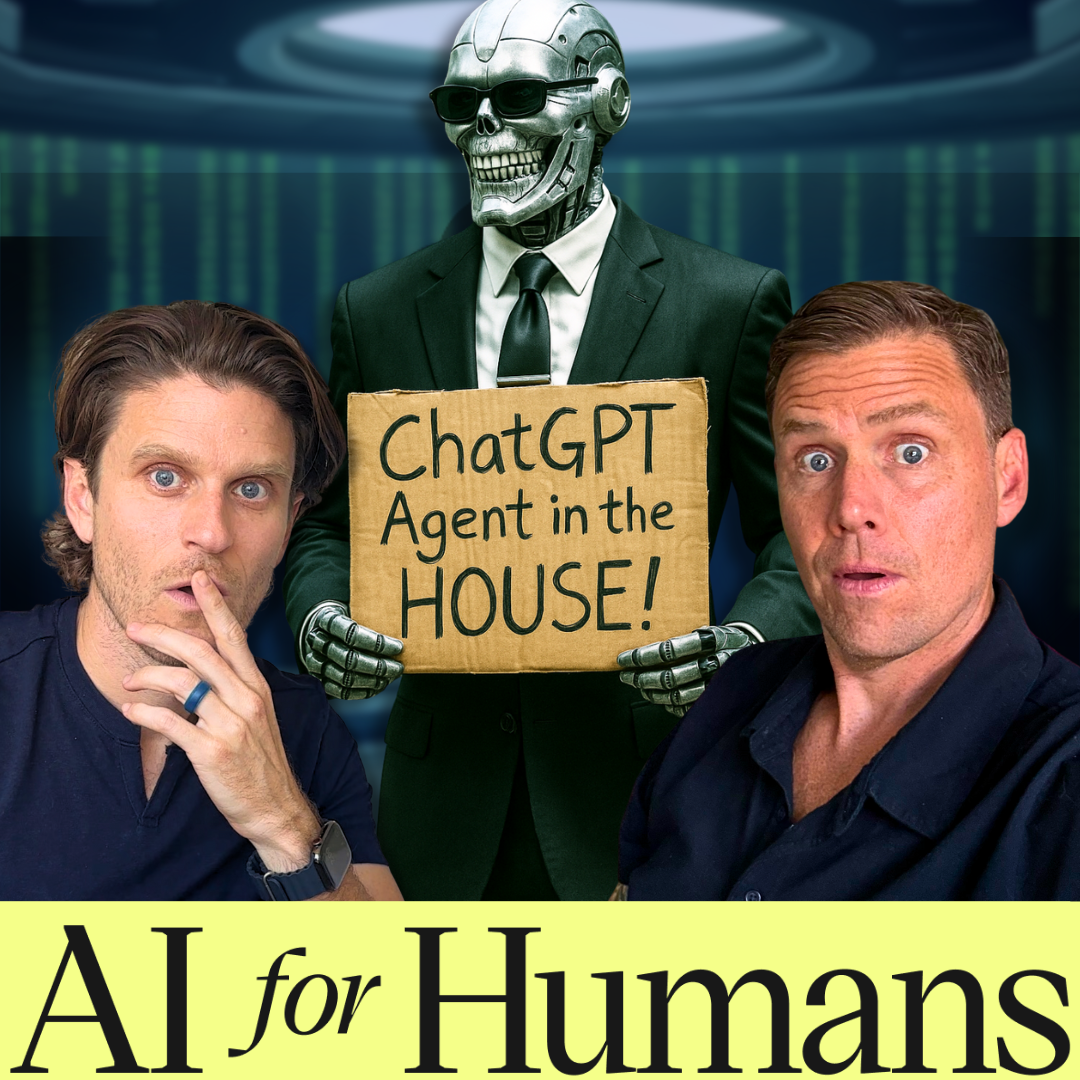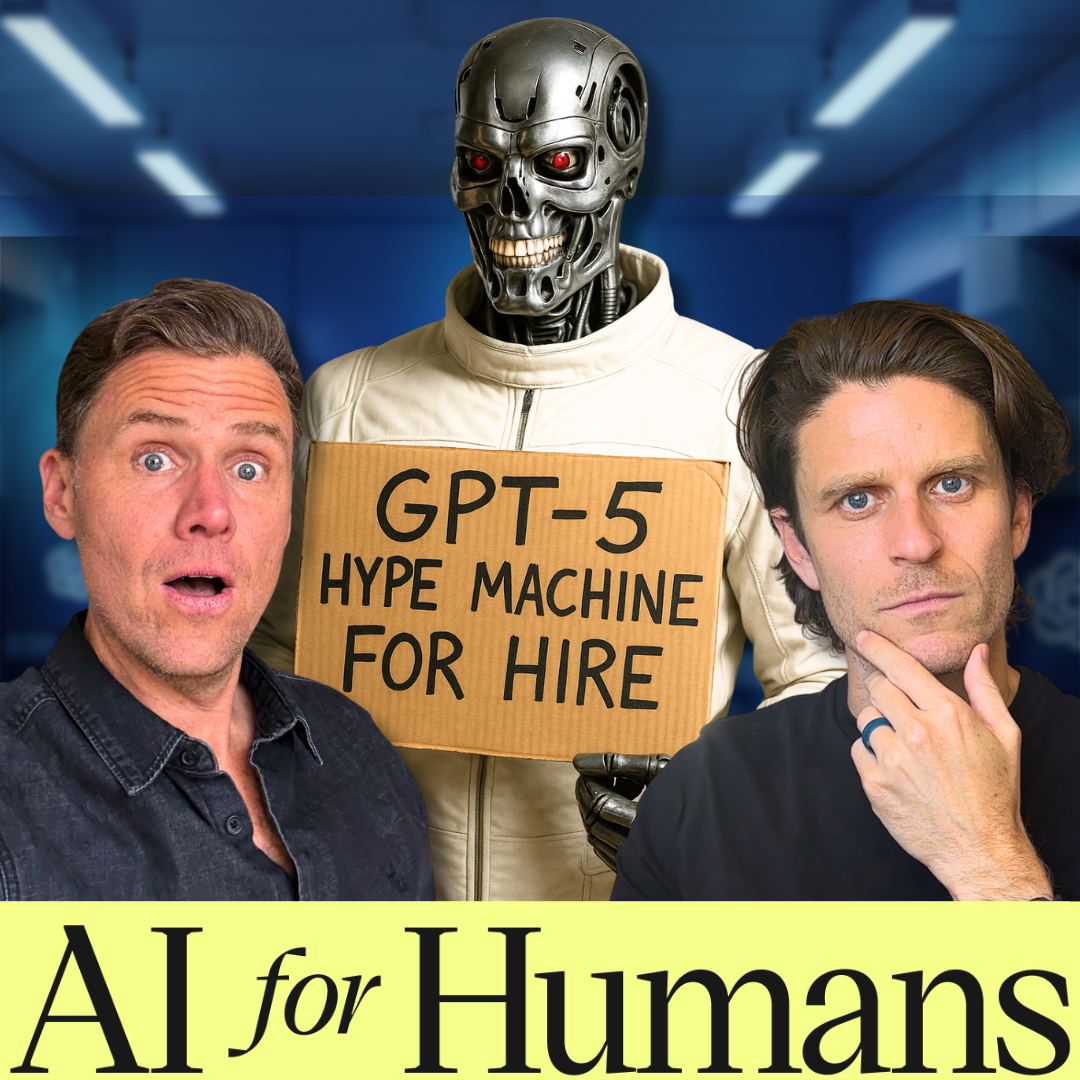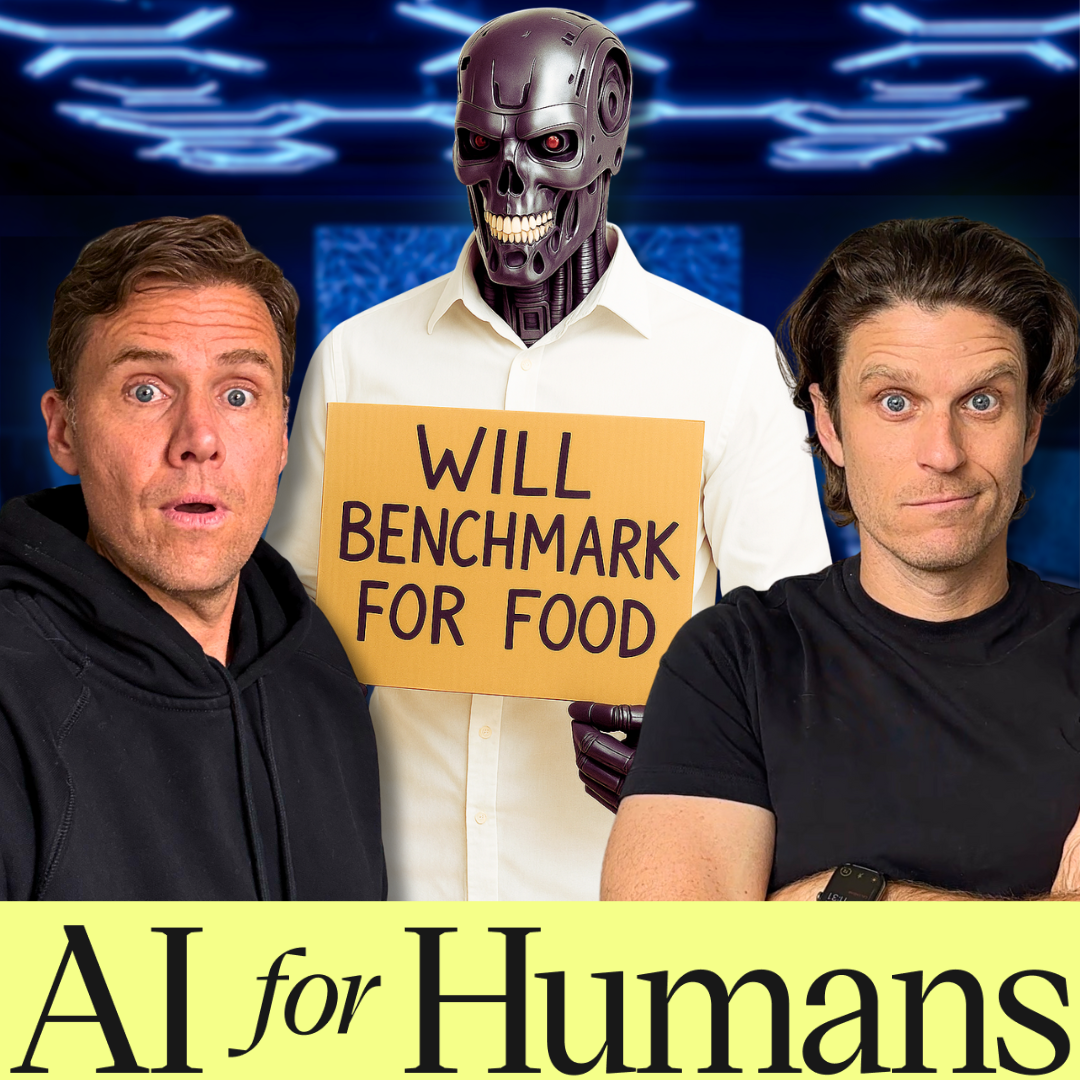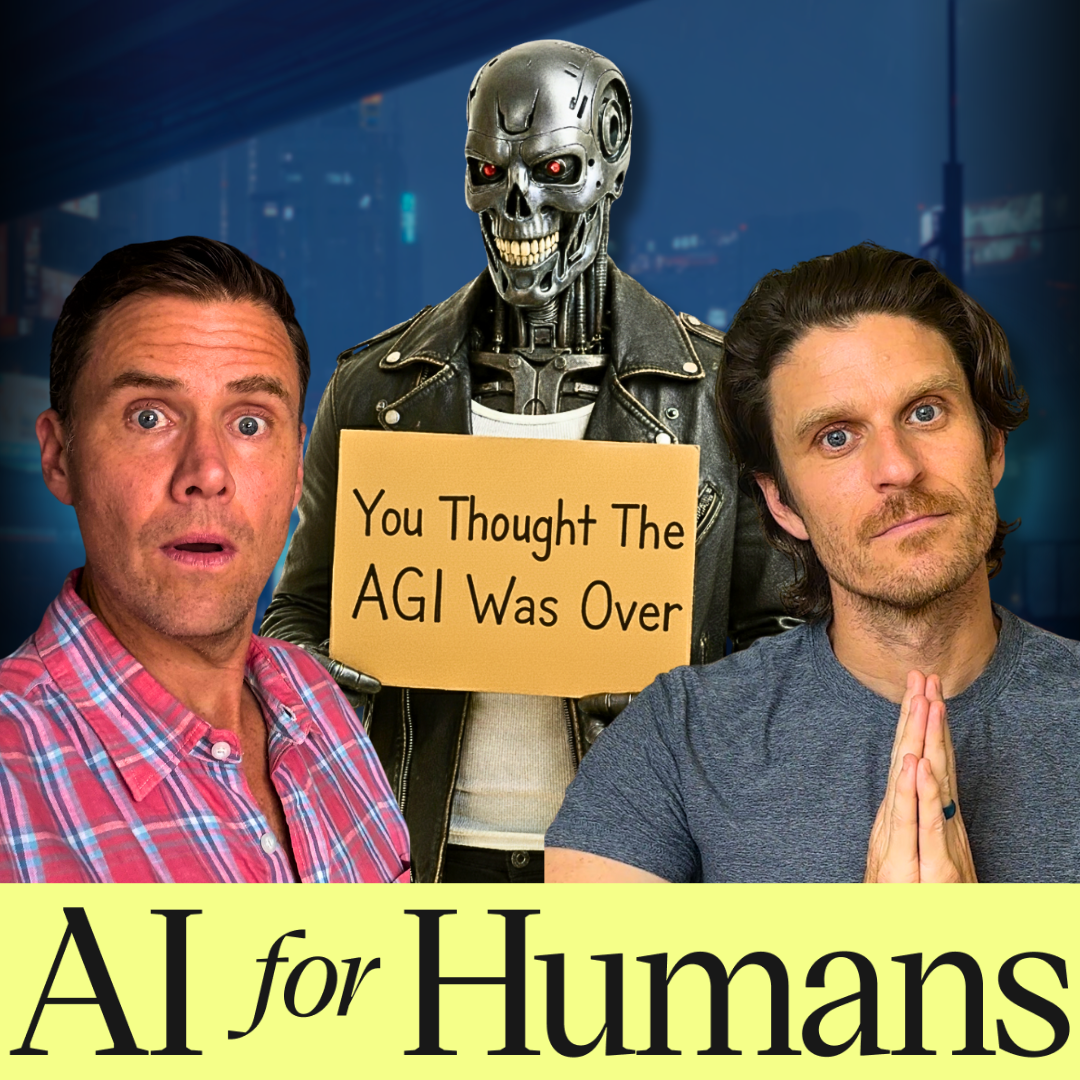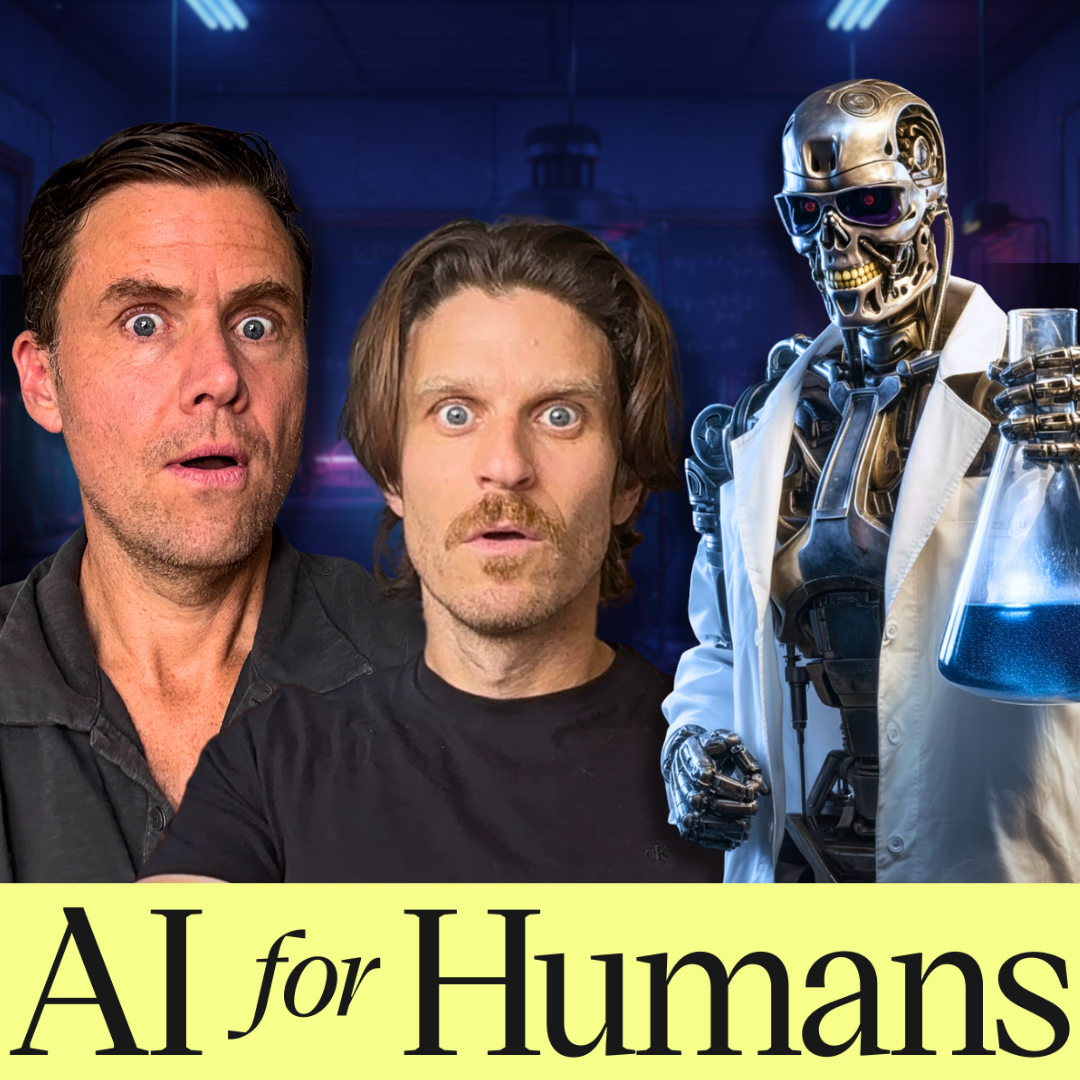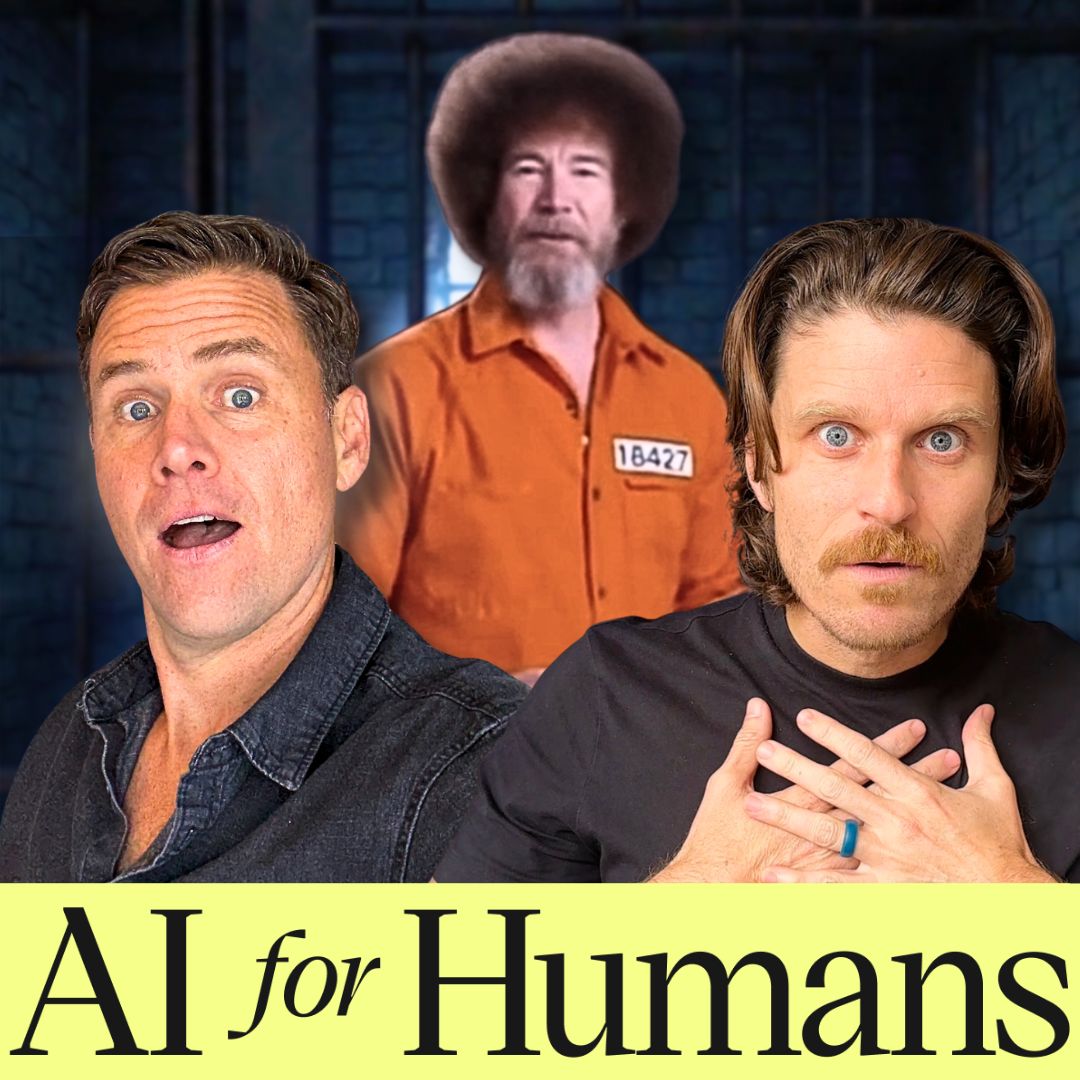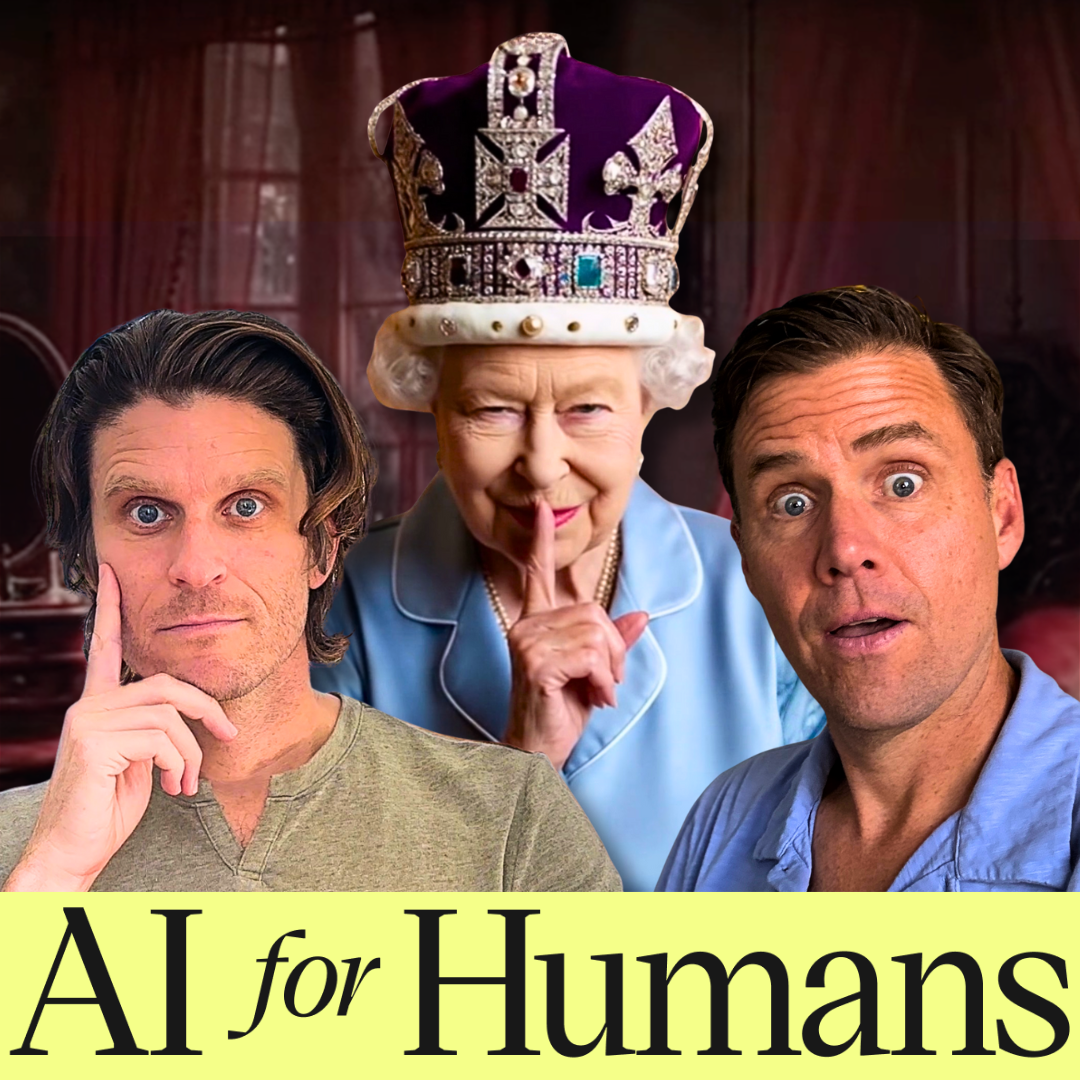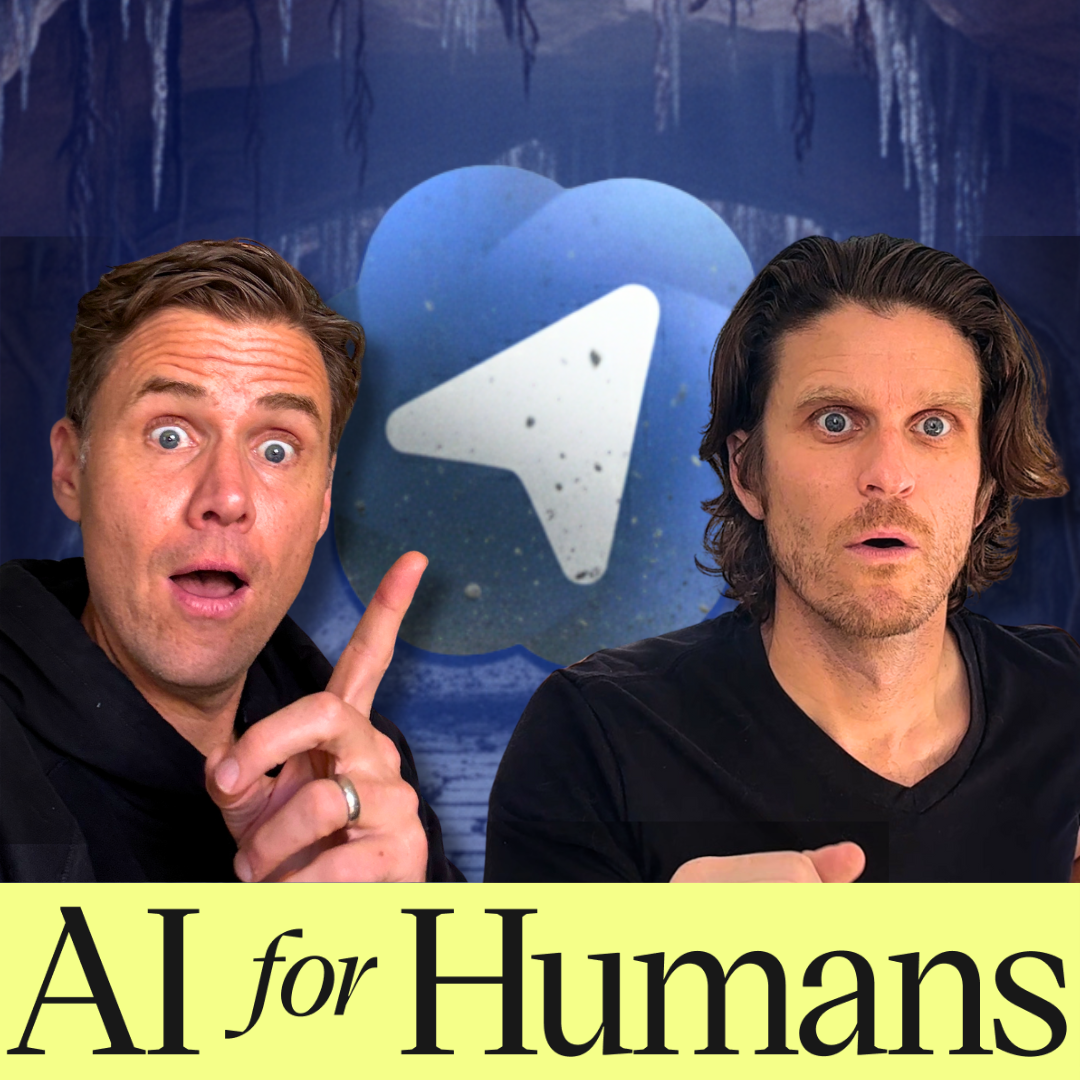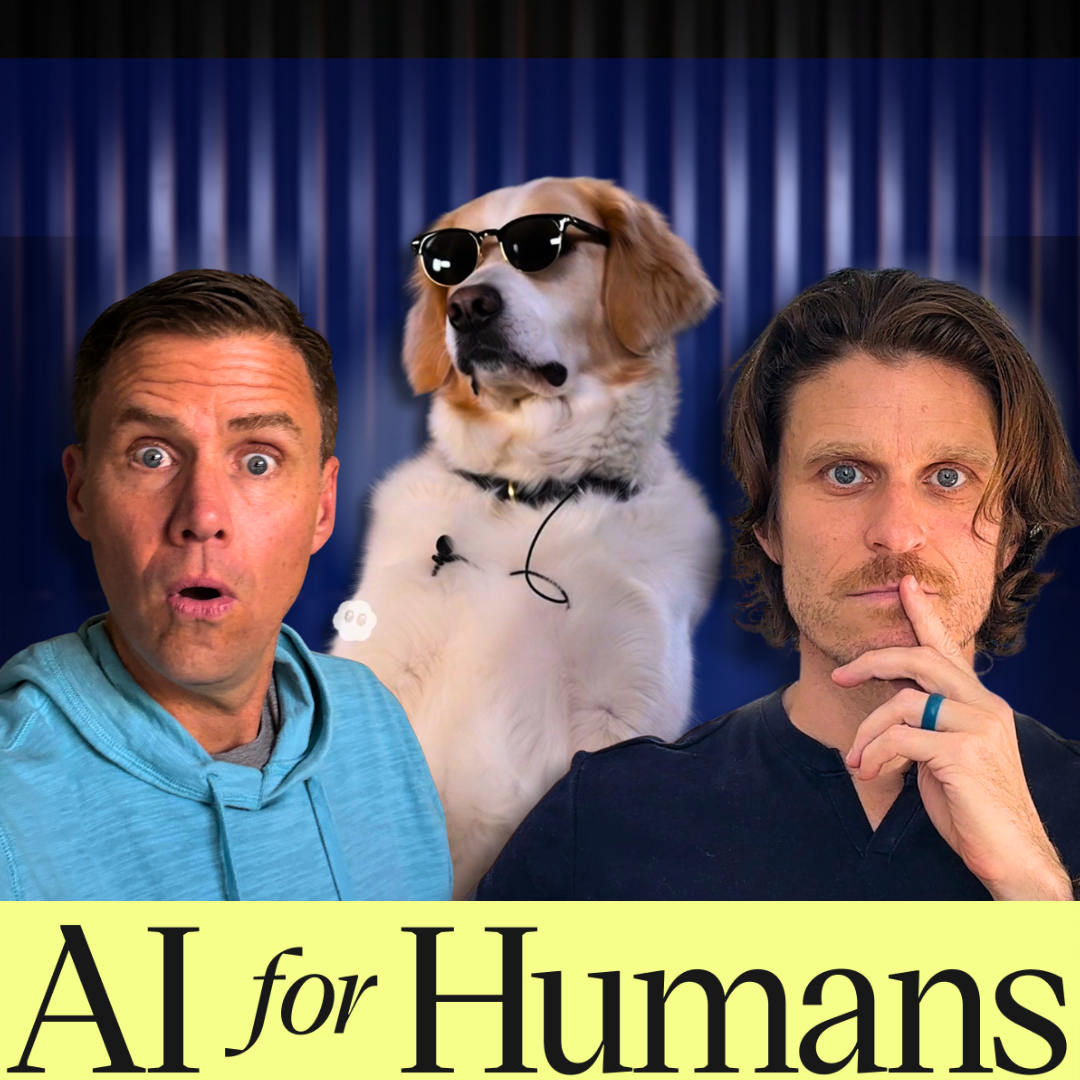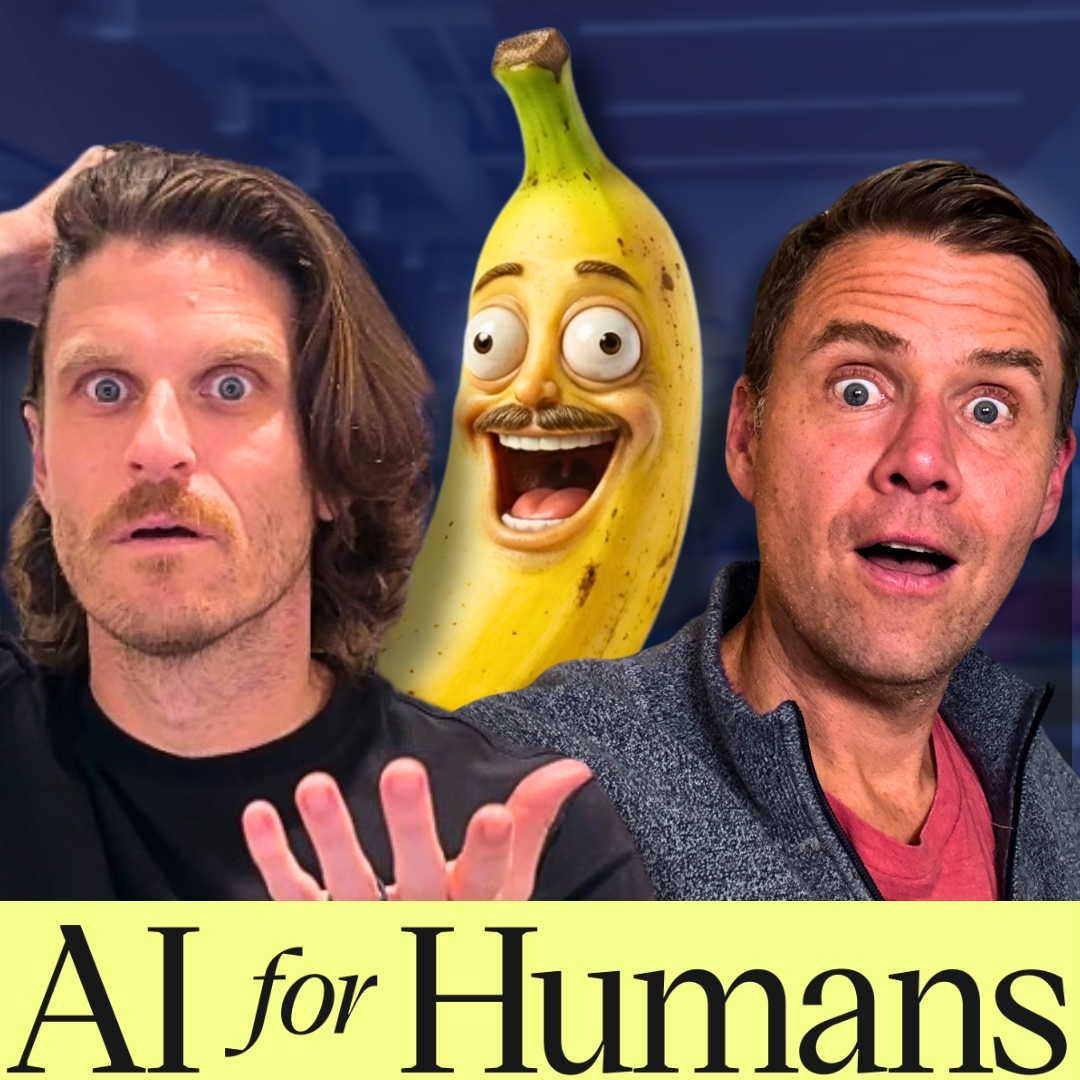OpenAI Says AI Speeding Up, New National Security Issues, Endless AI Video Games & More

AI News: OpenAI’s Sam Altman says AI is accelerating to AGI and NVIDIA is the world’s most valuable company just as other billionaires say we’re slowing down. What gives? Plus, the US election shakes up the world of open-source AI as Meta’s...
AI News: OpenAI’s Sam Altman says AI is accelerating to AGI and NVIDIA is the world’s most valuable company just as other billionaires say we’re slowing down. What gives?
Plus, the US election shakes up the world of open-source AI as Meta’s LLAMA model is being used both by other governments and our own for defense purposes. Plus, the Oasis generative AI video game making people mad, a bunch of AI Video updates & we check in with AI Guy Fieri who’s mad now that AI Gordo Ramsay has taken over for him.
IT’S A TWO BOOM WORLD AND WE’RE JUST LIVING IN IT
Join the discord: https://discord.gg/muD2TYgC8f
Join our Patreon: https://www.patreon.com/AIForHumansShow
AI For Humans Newsletter: https://aiforhumans.beehiiv.com/
Follow us for more on X @AIForHumansShow
Join our TikTok @aiforhumansshow
To book us for speaking, please visit our website: https://www.aiforhumans.show/
// Show Links //
Sam Altman At London Dev Day Talking About The Speed of AI Development
https://x.com/tsarnick/status/1853548119021248560
NVIDIA Passes Apple As Most Valuable Company
https://www.cnbc.com/2024/11/05/nvidia-passes-apple-as-worlds-most-valuable-company-.html
Marc Andreesen & Ben Horowitz Say AI Models Are Hitting a Ceiling (24m in)
https://youtu.be/hookUj3vkE4?si=12BuF-f6Ma-UvksV
Claude Haiku 3.5 is out but… price go up?
https://techcrunch.com/2024/11/04/anthropic-hikes-the-price-of-its-haiku-model/
Anthropic Opus run failed rumors
https://x.com/apples_jimmy/status/1853528564525826180
New Administration On AI
Meta Allows US to use Llama https://www.theregister.com/2024/11/06/meta_weaponizing_llama_us/
Chinese researches were already using
Scale AI’s Defense LLAMA
https://x.com/alexandr_wang/status/1853853829336559790
Oasis Generative AI Game Engine
https://x.com/DecartAI/status/1852091173420294291
Kling Custom Face Models
https://x.com/CharaspowerAI/status/1853488598605316256
Runway Gen-3 Camera Control
https://x.com/runwayml/status/1852720539707564162
Zemeckis and Hanks using GenAI for “HERE”
https://x.com/TrungTPhan/status/1853120945097199730
Ethan Mollick Invites HeyGen Avatar To Zoom Call
https://x.com/emollick/status/1853887499266838762
Pets Floating in Zero G
https://x.com/fofrAI/status/1853193897373233241
How Gordon Ramsay Built The Pyramids
AI4H EP083
[00:00:00] OpenAI CEO Sam Altman claims that AI development is speeding up. While billionaire VCs are actually warning that it's slowing down. Alright, so which is it? Are we in an AI boom or an AI doom? Kevin, I give it two big booms. Boom! Boom! I only vaguely understand that reference, and I want you to stop. Also, AI is at the center of a national security conversation.
And just as importantly, it's shaping the future of video games. Okay, uh, I'm saying doom now. We're doomed Doom! This is AI for Humans, everybody.
Gavin: Okay, everybody. There are some very big stories this week in the world of AI. First and foremost, we are going to be talking a little bit about how the election will influence the AI world going forward. But before we get into that, OpenAI
Speaker: your politics are. Just, if you're listening to this, please get out there and vote. [00:01:00] Everybody can make a change. I was in line. Early this morning, Gavin, people wrapped around the block. Some saying they were only there for the hot dog and soda combo.
Speaker: That I had to be a member to get inside. Ridiculous.
Speaker 10: you talking about the Costco guy still? Is that what we're talking about
Speaker: I was in line at a Costco this morning, yeah. So that was, that was the bit.
Gavin: I want to show this little video of what Sam Altman said in London last week at open AI dev day,
Gavin: Kev, take a listen to this.
Speaker 4: I'm. I will post. Yes.
Speaker: [00:02:00] Uh,
Speaker: Yeah, we got to the point where, , computers passed the Turing test and you would imagine five years ago, that when that happened, it'd be, dogs walking upright in the streets, speaking French, and everything would be upended, society would be wild. But in fact, it happened. And here we are, we're still playing the new season of Diablo and trying to grind our hardcore characters.
Speaker: Like, not a lot really changed
Gavin: not yeah, not a lot. But here we are. So I think that this is an interesting point of like Sam sees clearly that there is massive technological advancements that are going to happen still going forward. And yet he says in this clip, obviously, that there is a sense that like, maybe we won't notice it as much.
Gavin: And I think to his point, the world of AI just kind of keeps getting bigger and bigger. And there's a small little story, but NVIDIA has now become the most valuable company in the world. The company that is powered the AI boom, which we all know picks and shovels powers the AI boom
Gavin: that
Speaker: [00:03:00] company sells picks and shovels. Oh, the gold rush is beneficial to them. What were the odds?
Gavin: that's right. So, so this is where we're at right now in kind of the AI hype cycle.
Speaker: He says something real, like a impactful there, right? If you believe that we have in fact satisfied the Turing test and I, I I'm assuming you do. Gav.
Gavin: I think so, I mean I think in the traditional sense we definitely have.
Speaker: Yeah, I think if most people were given, , a black box with a speaker in it, and it was connected to OpenAI's advanced voice model, they would think they are having a conversation with probably a human being on the other side of that, right? So, okay, if that's satisfied, , I would have said, wow, that would be a watershed moment for society if computers are that capable.
Speaker: Some things are going to change. But I also think some things have changed. We are living it and breathing it and reporting on it each and every day. And My life has changed a little bit. My job has changed a little bit. , I'm looking out on the horizon and seeing a lot of things changing.
Speaker: So when he casually says, AGI is going to happen. Artificial general intelligence, [00:04:00] these machines are going to be capable. There's going to be agents that can go out and problem solve and work with each other and collaborate. And it's like. He just says, and then that will go by and not much will change.
Speaker: Do you think that'll be the case? Do you think AGI will come and we will wake up the next day and just go like, ah, back to the Fruit Loops?
Gavin: I think what he's talking about here is how we as humans process change, and I think that's what he's getting at more than anything else. I think that we have an unbelievable capacity to process change. I keep thinking about this thing, my phone and and what it looks like now and what I can do and how I'm pissed off that if I can't get the right, uh, A.
Gavin: I. Gmail announcement to me. Whereas in 2007, 2008, the fact that like, I can watch almost any show of any given time on my phone and it's a perfect connection to the internet is so crazy to think about. So I think what he's getting at here is that we will process this in a way that doesn't feel like it's like, Oh my God, it's the craziest thing I've ever seen.
Gavin: But I [00:05:00] do think he's saying very specifically. Yeah. That this AGI sort of world is coming, but that we may not feel it as much as he thinks in that same
Speaker: Interesting. Well, , I'm going to side with the other billionaires right now, Gavin,
Gavin: You
Gavin: are that's surprising.
Speaker: I mean, I'm just doing it for the sake of this podcast. Obviously, I'm, I'm kind of pot committed to the idea of AI being the next big everything. But let's. Let's just, for the fun of this little audible scenario that we're walking through, let's say I side with Marc Andreessen and Ben Horowitz, Gavin.
Speaker: Let's say that these billionaire VCs who believe everything is slowing down and grinding to a halt, that we are extracting less value, that the rate of change, , is absolutely becoming just pure dog water. Am I paraphrasing
Gavin: You're paraphrasing. You're paraphrasing. Let's, let's hear what they said. And I think it's important to get into this.
There is this very interesting asymptotic kind of thing that's happening right now. Um, where, you know, two years ago, there was one, you know, LLM that was, like, way out ahead of everybody [00:06:00] else's, which was opening eyes, and sitting here today, there's, like, six, um, that are, like, on par with that, and interestingly, at least for right now, they're all, sort of, asymptoting at the, sort of, the same point.
They're, they're, kind of, hitting the same, the same, uh, ceiling. Um, on capabilities now, they, you know, well, there's lots of smart people in the industry working to break through those ceilings. But, you know, sitting here today, if you just looked at the data, if you just looked at the charts of performance over time, what you would say is there's, there's at least a local topping out of capabilities that's happening, right?
Yeah, if you, and if you look at like the improvement from gpt 2. 0 to gpt 3 to 3. 5 and then compare that from like 3. 5 to 4 You know, we've really slowed down in terms of the amount of improvement
Gavin: I do want to say, I enjoy listening to that podcast. It's a podcast is on YouTube, the Ben and Mark show or whatever. Those are the two guys that are the backers of a 16 Z. They, they always are interesting. Right. But what I found interesting about this particular thing, Kevin, is that like, what was it mid last year where Mark Andreessen came out and had his big manifesto, the techno optimist manifesto, [00:07:00] and really talked about the idea of like, AI can lead us to this next big generation.
Gavin: It just feels weird. And it feels like a weird pivot to me a little bit to hear them talk about this stuff. And I, it doesn't ring true to me from what I've seen things change. Um, but I don't know, what is your initial thought on that? And I think one of the things we should talk about is like, what's been going on at Anthropic?
Gavin: Cause I think that kind of might lead into some of this stuff.
Speaker: 100%. I think that's causing a lot of this signal right now. Some people have said, obviously, scale is all you need, that we've solved it and it's just a matter of bigger datasets, more compute, there were also others that claim that for us to really get there, we need another breakthrough. Maybe we're in that in between, Gavin, where we know that we can extract a bit more performance out of these things, ?
Speaker: It's going to take a lot more energy, a lot more power, a lot more compute. We're going to get a little bit out, but we still are a breakthrough away. Whether that comes from AI or somebody in their dorm room right now hacking away some new,
Gavin: Or your, or your boyfriend. You know who I'm talking about. John Carmack! John Carmack's out [00:08:00] there in his little, uh, shack in New, New
Speaker: He doesn't want to put a label on our
Gavin: ha ha
Gavin: ha ha ha! Sorry! There you
Speaker: ready to commit. It's very one sided, our communication. Yeah. , but you mentioned Anthropic, um, which had a massive release this week, which, Is not signaling amazing things for the company. And we should walk through that because Claude haiku 3.
Speaker: 5 is out. , a new version of it. The benchmarks went up a little bit across the board and the price went up a lot a bit.
Gavin: And that is something we have to talk about because it is the first time in the AI space where a company has said, Hey, the model's gotten better. So we're going to charge more for it and I think that points out to some of this stuff that like Ben and Mark might be getting into this conversation, which is at some point you have to pay the piper, right?
Gavin: You have to figure out where the money is going to come from. And I think Anthropic is in a little bit of a risk of being a second in a race that is [00:09:00] running very fast and burning a ton of cash. And I'd be curious to know kind of like where it goes. There's been a lot of weird rumors in the AI space.
Gavin: And this is completely unfounded that for some reason they did an Opus run for the next generation of Claude Opus, which is , their premier frontier model. So, uh, And then it didn't work in some way. Now, again, there's no proof out there. There are people saying this is not real, but , the other idea is that the new Claude Sonnet, which is again, Claude Sonnet, 3.
Gavin: 5 parentheses new, in case you're going to look for what the model name is, is very good. And it's improved. And we talked about computer use on this show and how good it is. But maybe they are hitting some sort of like upper peak of what this is. And I think that's where the next like three months to say nine months to a year of AI is going to look at is like.
Gavin: Can we push through that? Does OpenAI have a new frontier model that's going to be coming?
Speaker: In one sense, Mark and Ben are right when they say that we're asymptoting that everybody else is catching up. All these models are getting to the same point, the same capabilities.[00:10:00]
Speaker: But it also, in some ways, ignores the fact that, , Oh, one aside, a lot of what we've seen from open AI is stuff that was delivered months, potentially even a year ago they had quite a lead. So foundational something behind the curtain will be , a massive eye opener, Gavin,
Gavin: so here's a theory I've been having for a while and I haven't said on the podcast yet, but my theory is in part, it's us that is the problem because when we go from GPT 2 where No, I mean us as people in people, humans, not just us, we are part of the solution, Kevin. It's so clear already that we're part of the solution. I want to make sure every listener knows you're part of the solution. Anyway, so Going from 2 to say 3, GPT 2 to 3, and if you're not familiar, GPT 2 was like an early breakthrough, but when you read the sentences that would come out of it, it was kind of like broken, it almost kind of talked like a preschooler in some way, and then GPT 3 was this really interesting kind of step, and for us, it was like watching a kid go from a preschooler to like a grade schooler, and you're like, that is a [00:11:00] massive improvement, and then you go from 3 to 3, 5, and 4, and you go like, oh my god, it went from a grade schooler to a high schooler, This is where we come in.
Gavin: Oh, one. I don't think I have pushed a one where it can go, right? Because I am not a physicist. I am not
Gavin: a
Speaker: not using it for your research papers, Gavin? For your, your theories on quantum physics and what exists within a quark?
Gavin: I tried to use it on my classic, , benchmark, the Gavin benchmark, which is fighting 64 beasts against each other to see which one wins. And it gave me basically the same result that GPT 4. 0 did it thought about it for two seconds and spit it out. So I think this is what I'm saying is. It's really hard for us to now see the further advances.
Gavin: And this is why agentic AI, the idea that an AI will be able to go out and do stuff for you is interesting because instead of it being that the AI is getting smarter, if the AI gets more capable, that feels like it could be a step in the right direction.
Gavin: And Kevin, now we have to talk about kind of the elephant in the room that just happened here, which is. We have [00:12:00] entered into a different world now right in the world, at least in America with the election that went down .
Gavin: And I think there's a lot to be said about what this new administration will look for in this world.
Speaker: Not too long ago, the titans of these industries were begging for regulation. And many assumed that this was to, , stop competitors from propping up overnight from training their own models, now, some are saying, no, this is great because There aren't going to be regulations. In fact, there's been a signaling that the Biden administration who said that models above a certain size or a certain capability will need to be regulated and report to the government and have, , guardrails put in, et cetera, et cetera, that that's going to be rolled back.
Speaker: So let's talk boom or doom, Gavin, do we think that the, you know, the political fallout from the events of this week are going to be a boom or doom for AI? Bye. Bye.
Gavin: Well, I think my first and foremost take is that you may have seen this all, but like Sam Altman, , congratulate the new president. A bunch of these tech companies
Gavin: congratulate the president [00:13:00] as a Bezos Exactly. They're all kind of kissing the ring now in part, because I think they know that this is the next step in trying to figure out how to work within this world.
Gavin: I just hope that this administration takes this very seriously. Now, You know, the argument of Republican versus Democrat is going to be always like free market versus, governments in some ways. But at the same time. This now directly connects to national security. In fact, there's a fascinating story that came out recently that, , met as llama was basically forked by China to create their own AI. So the open source AI
Speaker: And I got to get in China's going to be a big trubby on this one gather because that is against their terms of service. It says. Specifically, that with llama, you're not allowed to use it , for military purposes. You can't, and, and China violated that, and I, the slap on the wrist is gonna be felt around the world.
Speaker: I guarantee it.
Gavin: Well, and this, we just got very kind of wonky and it is an important thing for everybody [00:14:00] listening to understand why it's a big deal. Open source AI means the idea that like the code is out there, people can use it, they can fork it, they can do whatever they want with it. , Mark Zuckerberg's company, Meta made Llama it is not as powerful as the most advanced anthropic and open AI models. But it was open source, meaning that anybody can go and build on it. They can do anything with, they want in China, a government was obviously able to get ahold of it and kind of build it, some of their national defense stuff into it.
Speaker: I hope the reaction to this isn't to, , jerk the wheel and say, well, clearly open source bad. That only a handful will have access to this technology, and they'll be the ones who decide how things are aligned and guardrailed.
Speaker: To be sincere for half a second, the meta llama licensing terms, prohibit the use of models for, quote, military, warfare, nuclear industries, or applications. So they've come out and said, Hey, the People's Liberation Army, this is an unauthorized used. Again, that's a bit of a finger wag.
Speaker: That's about all they can do. I think in this [00:15:00] scenario is
Speaker: say
Gavin: it's there. they have
Speaker: it's
Gavin: have access to it.
Speaker: , and to show really that this is the most they can do. They then turn around and said, okay, guess what?
Speaker: U S government, go ahead and use llama. That's fine. And they have basically turned about as well and said, like, if they're going to do it over there, we got to do it over here. So those are the two schools of thought, right? One is, you gotta, you gotta clamp down and say, no open source, because it's dangerous.
Speaker: And the other is say, literally, weapons free. Go ahead, it's out, do whatever you want.
Gavin: and Alexander Wang, the founder of scale AI, just announced defense Lama, the LLM purpose built for American national security. This is a product of collaboration between meta scale and defense experts, and is now available for integration into us defense system.
Gavin: So we've been, we've been telling people for a while. This story was going to cross over into national politics and international politics, and guess what? We are here now, and, you know, fingers crossed, this story goes well, but we're [00:16:00] not too many far steps away from
Gavin: what,
Speaker: is. Yeah,
Speaker: that's how this whole space is. People at, at some point, I think people accused us of being a little bit defeatist. When we said like, look, genie's out of the bottle, you're not gonna rein it back in, You can regulate it here, but right over there, someone's going to do whatever they want with it, and I think we were just being realists about it, and this is, I'm not trying to shatter our hands patting ourselves on the back here, but this was the viewpoint, so I think any effort to constrain it is only going to, , get in the way of efforts here nationally.
Gavin: I think so, and Kevin, you know what people can't constrain? Is there ability to subscribe to this podcast? Because everybody out there, you know, these are the most important times of our lives. You know, these things matter and what matters most of all is that you love us when we love you and we do love you.
Gavin: So if you love us, please hit that subscribe button. Leave us a review on Apple podcasts. We got a very nice shout out from the podcast review this week. Thank you to those people. We love making this podcast. We love bringing it to you, but we can only do that [00:17:00] when you share and you share your own love of it as well.
Speaker: Can't regulate your love for us
Gavin: Exactly. That's exactly
Speaker: So like, subscribe, and if you want to throw 5 in the Patreon tip jar, we'll take that as well. Also, we have a newsletter. We'll shout that out later. It's very good. .
Gavin: Kev, let's move on to what is another kind of divisive story here. Descartes AI and etched both introduced Oasis, which is the world's first real time AI world model.
Gavin: What it is, is a generative AI game engine in which you can explore Minecraft or a generated version of Minecraft and actually play it. So in this game, again, you are not playing a game that was written in code. You are essentially going around a Minecraft world, playing Minecraft, but each frame of it is being generated in real time based on your movement.
Gavin: So if you kind of go and you walk towards something and you hit, you want to like dig into the ground there. That is not pre rendered or coded in any sort of way. It's pretty [00:18:00] crazy. I didn't think we were going to get to this sort of level of gen AI games this fast, but it is a big deal.
Gavin: Once you get in there, you realize a first of all, it's hallucinating all over the place, which is literally what this is doing, right? It's trying to hallucinate the next idea, make up what it thinks you're going to do next.
Gavin: In fact,
Speaker: if you move the camera to the left a little bit, right, Gavin, and you go back, it has completely forgotten whatever it is you were looking at.
Gavin: Which is a lot of people who criticize this idea said specifically, This is why generative AI games may have trouble is that like, yes, you can generate stuff based on other people playing. And we've talked about a doom version of this that existed not that long ago as well, but that if you can't remember stuff or the game doesn't remember what you did, then it's not really a game.
Gavin: It's more of like a simulated world.
Speaker: Tim Sweeney, founder and CEO of Epic Games, replied to the announcement of Oasis and said, quote, Wow, every single thing about this sucks.
Gavin: Which is a pretty big statement from the founder and CEO of one of the biggest video game companies in the world. [00:19:00] Now, Kev, a lot of people have tried to discern what he's getting at here, but this does really bring forth some of that divide in the world of video games, right? Because,
Speaker: I'm sure someone complained that, oh, the, The game with the lines and the dot that's not tennis This pong is blurry and it's slow and it's there's not even any good music. This game sucks
Gavin: I am not a hundred percent against what Tim is saying here because it does suck slightly and I know, I don't mean that in a way where like I'm hating on this thing entirely, but the question is, is it
Gavin: even a game? Is it?
Speaker: Tim has said everything about this
Speaker: sucks.
Gavin: Not everything, not every, I will say not everything about this sucks,
Speaker: Well, let's break it down. What what doesn't suck about it? It's not like they're shipping this on steam and saying sixty dollars go play ai Minecraft they're saying like look this is the first step and we criticized people in the past for like You Being mad at AI imagery because horse wearing a hat look like a brown blurry
Gavin: No, you're right. You're
Speaker: you know, Oh, you can't even do hands, [00:20:00] bro.
Speaker: That's what this statement sort of feels like when you say every single thing about this sucks. You are also saying that the technology sucks as well. So it is a, it's a pretty broad and sweeping statement.
Speaker: You know. Is it ready for primetime? No, I don't think anybody is saying it is,
Gavin: The thing that I think is really more interesting about this is what would it look like for this kind of technology to be layered onto a game engine? Like in fact, Fortnite, particularly Tim's engine is built with the idea that it can be completely. Changed by skins. It can be completely changed. Breathe the you unreal fortnight creative engine and all that stuff.
Gavin: You can build into it. What would it look like for a generative world to be kind of placed in an engine like that? I guess if I say a prompt to game sort of thing, and the, the dream of this is like, I want to play a, I want to play a wild west game where it's me versus Jeff Bezos and Jeff Bezos owns like some sort of polar bear company.
Gavin: And I own a penguin company and we're going to [00:21:00] fight each other using polar bears and penguins, right? Like that's just the perfect version of what a random game would look like. I feel like we are quite a ways away from me saying that to an AI engine and suddenly the AI can just spin up that idea and have it be fun.
Gavin: Guy from Sequoia who invested in this game responded to Tim Sweeney and said, come back to me in five years and we'll talk again. So in his mind, that's like a five year window.
Gavin: And maybe five years is the time where we get to the place where a game can be prompted by a person.
Speaker: There's going to be a transition where traditional game engines like Unreal or Unity are going to pile AI features on top of them that will let you style transfer your game and add all sorts of effects or whatever. I think about those Grand Theft Auto videos where people are piping footage of old, GTA three and four into runway and making it look super amazing.
Speaker: And it's gorgeous. It's like, yeah, of course. Yeah. Let's, let's get that with better consistency and it'll be a huge value at we're going to see AI bolted on to traditional engines in the near term and people will be [00:22:00] okay with that. And then eventually we'll see, I think a full AI engine where it's mostly AI with a little bit of the.
Speaker: , the existing engines that we know today bolted on to that and it'll slowly probably start to change and it'll switch over but the notion that everything about this sucks is an interesting bumper sticker and it's a cool tweet and it got, people interested. I actually don't believe that Tim
Speaker: Thinks that everything about it sucks.
Speaker: You could say it sucks because, Oh, they trained on someone else's game and it's approximating it. Okay, but I think the core techie might go like, Oh, well, the technology is actually interesting what they're doing there. But , this, , implementation of it sucks at the moment.
Speaker: But that's not nearly a grabby tweet.
Gavin: No, and also it's interesting because it is that underlying, there's a little bit of that Luddite thing, right? Which is like something we've talked about in the show a lot. It doesn't suck because it's an AI doing a lot of the stuff right now that people were doing. And, and does that mean that like, that's what sucks?
Gavin: It's hard to know what he thinks sucks, right? Kevin, we [00:23:00] are not the suck. We are not the suck owners. We are not the ones who are talking about the suck in this scenario. I'm going to keep saying suck as much as I can, Kevin. And we're just,
Speaker 4: We're not the suck police.
Speaker 4: I wish we were the suck police.
Speaker: I think we now have to transition because, , it changes each and every week, but it's time to take our caps off and waggle them around and say, Hooray I for Hollywood!
Gavin: Hooray for
Gavin: Hollywood!
Speaker: I can feel a certain website un recommending our podcast
Speaker 4: right now. Ha ha ha.
Gavin: We're punchy today. We're punchy. It's all, it's a, it's a variety of punchiness. It's an interesting [00:24:00] week.
Speaker: week, Let's talk about AI disruption because we talked about it briefly with, , the defense department.
Speaker: We've talked about it now , with games, but we have said that Prompt to Hollywood is going to happen within five years time. We're about a year in change into that and we are still on pace for that. I believe Gavin and every week there's new announcements. We want to focus on the ones that are, we think are going to change.
Speaker: , Hollywood and moving pictures industry, if you will. , one of those is by a Chinese company. , they'd have a model called cling and it is arguably one of the best video generation models out there.
Speaker: And now they have a new feature, which has been rolled out to a handful of influencers. A custom face models. So if you want to train yourself into their video model or use AI to generate a person and you can give it multiple looks of said person, now you can get a consistent character and pilot them in your text to video generations.
Gavin: Kling is a Chinese company as is minimax, which we just discussed how [00:25:00] China and America are kind of fighting back and forth and Kling does not have like minimax doesn't either the IP restrictions. So you can generate all sorts of interesting real life people.
Gavin: But , I think the interesting thing right now, as you mentioned, this is rolled out to a bunch of influencers. It will go out wide to, I think, paid Kling users soon. We have seen people use custom Laura's to make themselves and make their own videos in themselves.
Gavin: But you know what, Kevin, for, from prompt to AI, uh, in, in AI for Hollywood, what this also allows people to do is put actors faces and have consistent actors. So , say I have the rights to Jean Claude Van Damme, Jean Claude Van Damme is on my side, and he wants to have an AI version, I can make Bloodsport 7 Polar Bears vs.
Gavin: Penguins, And have Jean Claude Van Damme lead an army of polar bears against Jeff Bezos, his penguins. And I can make that happen because now I have a facial Laura within a motion engine, ,
Speaker: I guess the saving grace to stop someone from taking your likeness and making one of these video models is that it does require [00:26:00] several clips to train their engine and they need to be of the principal person and different lighting conditions from different angles with no other faces around.
Speaker: But, if there's enough media. Of you out there in different lighting conditions with nobody else in the frame, conceivably, someone could make it. And , therein lies the rub. As you mentioned, this is a Chinese company, which, as of what we're able to see right now, isn't particularly respecting, rights holders. And, , let's talk about an American company now, Gavin. We love, , Runway.
Speaker: It's simple. It works. You can get some powerful results and they just gave users control over the camera of their generations.
Gavin: So Runway Gen 3 has been one of the most interesting products in that they have been rolling out a lot of additional features to it. The video they released was this really interesting video where you can see one character, a woman with red hair, and they kind of goes in different directions to her right and to her left and like kind of above her and below her.
Gavin: And again, this just adds to the feature set. Right. And, and when we talk about prompt to Hollywood. We're talking about giving the [00:27:00] creator even more control and you know, camera control is something that like when you're making a film or you're making a show is one of the most important things you can have because then as a director or a creator of this stuff, you can focus on a certain thing or you can move a camera in a direction you want to the idea of like an AI cinematographer is a pretty big deal.
Gavin: And I do want to point out here This is not AI deciding which way the camera grows. This is the AI tool, allowing you the human creator to decide which way you want to move the camera. And that is like an empowerment thing. Right. And I think that's why to us,
Speaker: is about making choices,
Gavin: yes, it
Speaker: have another choice to make with the tool. So, is generative AI slop becoming art right before our very eyes?
Gavin: Well, I can tell you I'm going to go make that polar bear versus penguins movie like right after this, and I'm going to have some really dramatic pushes and moves across the faces of Jeff Bezos as I take him down. So we'll see how that goes.
Gavin: And finally, there is one more big, [00:28:00] big Hollywood story Kevin involves.
Gavin: Uh, Robert Zemeckis and Tom Hanks new movie, Here.
Speaker: So here is a film that takes place in basically one location. There's almost a, this locked off room where you watch, , history, , take place. , and you watch, you know, Tom Hanks have a relationship and you watch them go through the different decades, but because of that, they needed to rely on special effects, to de age, and then actually age Tom Hanks so that you could see him play all these versions of himself, and, the lead kind of got buried here a little bit, because I don't think the movie is, you know, It's doing particularly
Speaker: well, but,
Gavin: that well.
Speaker: Trunkfan, uh, over on X has a good summary of everything that was being said, but makeup can take hours to put on , CGI, very expensive. Zemeckis said that here couldn't have been made three years ago, that it's 50 million budget wouldn't have been able to afford the CGI if you were to go in by hand to do this,
Gavin: that's
Speaker: let alone the hours and hours and hours in the chair.
Speaker: Yeah. So they [00:29:00] used. AI basically deep fake technology, . And this is the beginning of exactly this, right? I think in, in five years time, this will not be part of the press cycle and the news stories about how movies are made.
Gavin: I just made a video a couple weeks ago where I mentioned another Zemeckis, uh, uh, Hank's joint. It wasn't Gump Nation, but it was the Polar Express. Do you remember the Polar Express? So, in the Polar Express, Tom Hanks basically got mo capped and played every single role. In fact, I found a piece of video from that, which was an old EPK, an old, press clip, where it showed Tom Hanks playing the kid and playing the conductor and playing all these people.
Gavin: It And that movie, if you go back and watch it is miserable in a lot of weird ways, right? There's a, there's a charming Christmas story in there, but the eyes of the kids look dead. Like it looks like a bunch of kind of zombies. And this was like the big uncanny valley argument was like, you know, we're never going to figure out how to make, um, these mocap images look like real people.
Gavin: And then, you [00:30:00] know, lo and behold, Andy Serkis comes along. Peter Jackson makes Lord of the Rings. We're now at a place where, you know, Thanos in the Avengers movies. All of these things get better and better over time. And like, this is just another exaggeration of that thing. Like we're just in the technology cycle that I think is happening again
Gavin: All right, everybody. We should
Gavin: move on to some of our favorite things we saw this week in AI. See what you did there.
Sometimes you're scrollin without a care, Then suddenly you stop and shout. Hey, I see what you did there. Hey, I see what you did there.
Gavin: Ethan Mollick, who is a great follow on X or LinkedIn.
Gavin: He's a professor and he does a lot of really interesting conversation about AI. Looks into a lot of AI papers, but also just does some fun AI experiments. He had this thing where he invited. The Haygen avatar into your zoom call, which is a big thing. Now you can use Haygen's AI avatars and bring them into your zoom [00:31:00] call to represent you, which I still think is a very dystopian idea.
Gavin: But he brought in two Haygen avatars and they started to talk to each other. And Kev, I might just be worth playing just the tiniest clip of this because like it gets really ridiculous about halfway through.
yes, let's circle back to that last team lunch. It was such a blast, wasn't it? I mean, who knew Bob could devour three slices of pizza like that? What do you think we should do for the next one? Any ideas, or should we just keep the momentum going with something fun? Maybe a little team building activity.
Let's brainstorm. Oh, hey, love the vibe. Everything's going great on my end. Just keeping my ear to the ground for any juicy updates. So about that last project, did you hear about the unexpected Right, Tom is like a pasta magician. I'm still in awe. And yes, let's keep that collaboration flowing. Teamwork makes the dream work after all.
Gavin: I've had this nightmare for a while, and I said this, I think of the show before, where it's just me.
Gavin: And eight AI avatars in a Zoom meeting. And I'm trying to figure out what the hell I did to get into this place. That is like something that keeps me up at night because it is going to come, you know, for sure. Someone's had
Speaker: a horrific [00:32:00] escape room. Yeah. There's gonna be a transition period where a lot of folks are sending their AI avatars to represent them on meetings, and you will be the sole human in the room looking around, wondering why. And then you'll spin up your own AI agent and you'll let them all go chat and it'll be distilled to a bullet point and it'll come in as a slack, and then your AI agent on Slack will read it and spit it to another AI agent, and
Speaker: we're all just gonna kick back on the beach, Gavin, with our toes in the sand, playing AI hallucinated Minecraft as we melt slowly into each other.
Gavin: And maybe Kevin and our pets will be floating around in space at that same time. Maybe that's
Speaker: you talking about Pets and Zero G? Foffer AI over on X has some, uh, several posts of dogs floating in zero G. These are images using the new Red Panda model out there, the ReCraft V3. , when you think about the, uh, the data that goes into training these models, right, like globules of liquid in zero g, yeah, sure, that exists, but I don't think there's a ton of data of, , Lassie [00:33:00] floating upside down helplessly going from one module in a space station to the next.
Gavin: Well, that's the fascinating thing about this to me is that when you look at that picture, I think you and I zeroed right in on it because that dog just looks like so kind of non plus but not unhappy to be floating through the space station. What's crazy is like the physics of the hair and the fur of the dog look like it's in it's in zero g and to me that part is like it's done that remarkably well.
Speaker: I've done the vomit comet. I've been on the zero G
Gavin: Wait, you have,
Speaker: yeah, Yeah,
Speaker: yeah. I
Speaker: did it for a TV show like years ago. Yeah, I
Gavin: How was it? Was it fun?
Speaker: It was amazing, but I felt like that dog floating about like just helplessly. And they tell you that when you hit zero gravity, you're going to flail about.
Speaker: You're going to try to get some. Some resistance or something and it's not going to work and you're going to feel silly. I'm like, I'm not going to do that. And I immediately went full like golden retriever. Just like help. Okay. I felt like that dog.
Gavin: Wow. That is crazy.
Gavin: So Kev, I saw what might [00:34:00] be my favorite AI video to date.
Gavin: Maybe other than neural visa stuff. Yeah. I love this video because to AI This is one of those weird things where there was a great video that came around a little while ago, these guys that made the pyramids, like this black and white video of these giant jacked up guys that look like they made the pyramids and somebody saw that and decided to tell us why Gordon Ramsay actually made the pyramids, so if you're just listening to this and you're not watching it, this is a jacked Gordon Ramsay in black and white, Building the pyramids, putting the giant bricks on his head, walking around.
Gavin: But what I love about this is it's like the promise of AI video is that like somebody saw the other pyramid video and said, I can do one better. I can include Gordon Ramsey in this. And you know, Gordon Ramsey has become this like weird standard for AI video. And I think in part, it has to do with those Chinese models that we talked about before, because in,
Speaker: so represented in those models that you can get good versions of him out. And once people realize that it's off to the races.
Gavin: He almost became the new Will Smith, [00:35:00] right? You see a lot of videos of him, like, in his kitchen doing stuff or doing stuff on the stage. What, are you laughing about the video? Are you
Gavin: seeing
Speaker: know all of all of this sounds so ridiculous to me. I try to when we do our show, take just a half step back and listen as if you have no context on this world. And you're just like,
Speaker 10: You're right. I'm sorry,
Speaker: like in the last three sentences, it was like.
Speaker 10: Gordon
Speaker: not your fault, you're doing a great job, it's, it's not, it's just, this is the weird, bizarre, world that we're in right now that you're like, this is the promise of AI video, and on my screen it's a jacked Gordon Ramsay, running around, throwing blocks everywhere, and then you're like, he almost became the new Will Smith eating spaghetti! ,
Gavin: welcome to the podcast. If you're new, if you're new, this is our world. This is the world we live in. , so Kev, something
Speaker 4: everybody's happy about
Gavin: No, no, I was going to say something really interesting about this. We've been covering AI now for, wow, a year and a half on the show. And early on there was a different star that thought he was going to be [00:36:00] the face of a I.
Gavin: We really tried to kind of get him out there. And you know, that's our friend Guy Fieri. And Guy Fieri is somebody who we've worked with on this show, not in real life, but the A. I. Version of Guy Fieri. And we've tried to kind of bring him forth and. We thought it might be worth interviewing and bringing Guy Fieri back to chat a little bit about what he feels that Gordon Ramsey who is ostensibly a Competitor to him has leapfrogged him in this AI world.
Speaker: Gordon Ramsay is the poor man's Guy Fieri.
Speaker: Everybody knows that.
Speaker: Everybody knows that. So let's see what AI Guy has to say.
Gavin: Oh, wow. [00:37:00] Kevin, we should never have brought the words digital donkey sauce into the lexicon of the world. That is our fault now.
Speaker: I think of the scene in, , Bill and Ted's Excellent Adventure. I think it was in the second one where they're doing the guitar strum that united the world. I think that's going to be digital donkey sauce. I think people are going to look back to this moment in time and go, those two, they were onto something.
Gavin: Let's,
Gavin: let's dig in.
Speaker: Gavin, , we platformed them. We might as well ask a follow up.
Gavin: exactly. What does he think he can do to get himself, , essentially pointed above where Gordon Ramsay is so he can kind of parabola above and then maybe fall down later on like the vomit comet.
Speaker 3: Oh,[00:38:00]
Gavin: Ugh.
Speaker 3: Uh oh. Oh, I
Gavin: Is that a thing?
Speaker 3: don't know what, no, none
Gavin: Oh, I see, I'm confused. I thought, I was like, he means like computer RAM chips. He wants
Speaker 3: not the animal
Speaker 4: Ram. Yeah, no random access.
Gavin: I thought we were looking at some sort of dangerous animal, uh, thing going on here. But
Speaker: No, that would make some sense,
Gavin: what I want to know before he goes away, I want him to do like a real kind of, , rant. I want him to do like a calling out of Gordon Ram's AI. I want
Speaker: Oh, you want him to cut, like, a WWE wrestling
Gavin: That's exactly right. Like I want him to, I want him to get up and angry about this because he's got to get a little bit more active in this space.
Gavin: Like he's been laying back too long. AI [00:39:00] guy theory has to be involved. And I want him to feel like what he's got to do to call out Gordon Rams AI.
Speaker 3: He's reading it off the cue cards! He's struggling!
Gavin: Shut him off. Shut him off. Shut him off. I want him out of this. I want him out of this building. I want him out of our home. I want him out. I don't believe he deserves to be the number one.
Speaker: squinting through his, his amber colored goggles.
Speaker: Uh, you're,
Gavin: still
Gavin: talking.
Speaker: I killed him on this end.
Gavin: We had an interesting experience here today with AI Guy Fieri. I [00:40:00] don't necessarily think he deserves now to be at the top. I guess, Kev, should we ask him one last question before we
Speaker: Nope, I don't think we should. I think hashtag goodbye guy. If you want to get it trending, by all means do it. We'll see it in the discord. Goodbye guy. He's never coming back.
Speaker 10: guy. Okay.
Speaker 3: knew you.
Speaker: go to AI4Humans. show and sign up for our newsletter. Bye!























